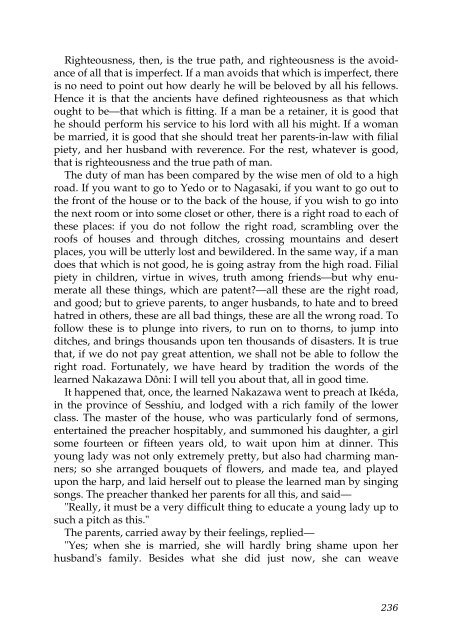You also want an ePaper? Increase the reach of your titles
YUMPU automatically turns print PDFs into web optimized ePapers that Google loves.
Righteousness, then, is the true path, and righteousness is the avoidance<br />
<strong>of</strong> all that is imperfect. If a man avoids that which is imperfect, there<br />
is no need to point out how dearly he will be beloved by all his fellows.<br />
Hence it is that the ancients have defined righteousness as that which<br />
ought to be—that which is fitting. If a man be a retainer, it is good that<br />
he should perform his service to his lord with all his might. If a woman<br />
be married, it is good that she should treat her parents-in-law with filial<br />
piety, and her husband with reverence. For the rest, whatever is good,<br />
that is righteousness and the true path <strong>of</strong> man.<br />
The duty <strong>of</strong> man has been compared by the wise men <strong>of</strong> old to a high<br />
road. If you want to go to Yedo or to Nagasaki, if you want to go out to<br />
the front <strong>of</strong> the house or to the back <strong>of</strong> the house, if you wish to go into<br />
the next room or into some closet or other, there is a right road to each <strong>of</strong><br />
these places: if you do not follow the right road, scrambling over the<br />
ro<strong>of</strong>s <strong>of</strong> houses and through ditches, crossing mountains and desert<br />
places, you will be utterly lost and bewildered. In the same way, if a man<br />
does that which is not good, he is going astray from the high road. Filial<br />
piety in children, virtue in wives, truth among friends—but why enumerate<br />
all these things, which are patent?—all these are the right road,<br />
and good; but to grieve parents, to anger husbands, to hate and to breed<br />
hatred in others, these are all bad things, these are all the wrong road. To<br />
follow these is to plunge into rivers, to run on to thorns, to jump into<br />
ditches, and brings thousands upon ten thousands <strong>of</strong> disasters. <strong>It</strong> is true<br />
that, if we do not pay great attention, we shall not be able to follow the<br />
right road. Fortunately, we have heard by tradition the words <strong>of</strong> the<br />
learned Nakazawa Dôni: I will tell you about that, all in good time.<br />
<strong>It</strong> happened that, once, the learned Nakazawa went to preach at Ikéda,<br />
in the province <strong>of</strong> Sesshiu, and lodged with a rich family <strong>of</strong> the lower<br />
class. The master <strong>of</strong> the house, who was particularly fond <strong>of</strong> sermons,<br />
entertained the preacher hospitably, and summoned his daughter, a girl<br />
some fourteen or fifteen years old, to wait upon him at dinner. This<br />
young lady was not only extremely pretty, but also had charming manners;<br />
so she arranged bouquets <strong>of</strong> flowers, and made tea, and played<br />
upon the harp, and laid herself out to please the learned man by singing<br />
songs. The preacher thanked her parents for all this, and said—<br />
"Really, it must be a very difficult thing to educate a young lady up to<br />
such a pitch as this."<br />
The parents, carried away by their feelings, replied—<br />
"Yes; when she is married, she will hardly bring shame upon her<br />
husband's family. Besides what she did just now, she can weave<br />
236



